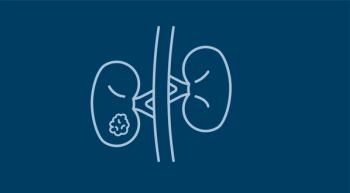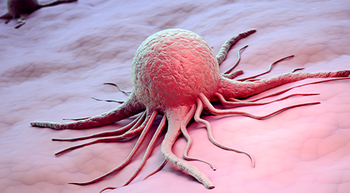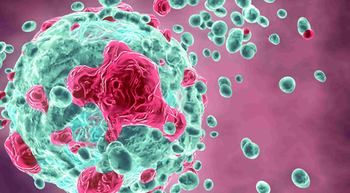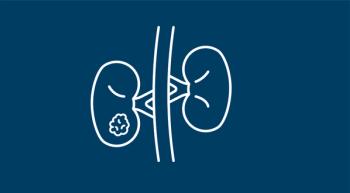
Six-year follow-up data showed an overall survival rate of 89% among patients with follicular lymphoma who received either lenalidomide plus rituximab or immunochemotherapy.

Six-year follow-up data showed an overall survival rate of 89% among patients with follicular lymphoma who received either lenalidomide plus rituximab or immunochemotherapy.

Julie Malo, CCRP, a research nurse with the University of Montreal, discusses a nurse-directed initiative examining how the gut microbiome affects immune checkpoint blockade responses in patients with non–small cell lung cancer.

Results of retrospective analysis of previously treated patients with metastatic renal cell carcinoma who received nivolumab in the second- and third-line showed that health-related quality of life was maintained in the real-world setting

Neoadjuvant immunotherapy starkly outperformed neoadjuvant chemotherapy in eliciting major pathological responses among patients with mismatch repair–deficient colon cancer, according to investigators.

At a median follow-up of 22.9 months, patients with platinum-refractory metastatic urothelial carcinoma achieved a median overall survival of 14.6 months with EphB4-human serum albumin plus pembrolizumab.

Sherry Adkins, MSN, ANP-C, discusses the significance of incorporating CAR T-cell therapy regimens, such as lisocabtagene autoleucel, into earlier lines of treatment for patients with relapsed/refractory large B-cell lymphoma.

Kelley A. Rone, DNP, RN, ADNP-c, highlights the pivotal trials assessing the role of immunotherapy in gastrointestinal cancer and what the findings may mean for oncology nurses.

Beth Sandy, MSN, CRNP, discusses some of the challenges that may be associated with molecular testing, and how oncology nurses can help play a role in ensuring that the reports are received.

Kelley A. Rone, DNP, RN, AGNP-c, discusses the advantages associated with immunotherapy in the treatment of patients with gastrointestinal cancers.

In early-stage cancers, ctDNA has a role in screening, neoadjuvant monitoring, identification of molecular residual disease (MRD), molecular relapse monitoring, and early assessment of treatment response.

Arndt Vogel, MD, PhD, discusses a post-hoc analysis of the phase 3 HIMALAYA trial which found tremelimumab plus durvalumab to be superior to sorafenib in improving overall survival.

Nivolumab, whether in combination with ipilimumab or as a monotherapy, was associated with improved overall survival, progression-free survival, and melanoma-specific survival, compared with ipilimumab in advanced melanoma.

A subgroup analysis found that the addition of durvalumab to chemotherapy resulted in maintained overall survival benefit in patients with advanced biliary tract cancer, regardless of primary tumor location.

Data from the CheckMate 648 trial informed the FDA’s recent approval of 2 nivolumab combinations for esophageal squamous cell carcinoma. A 1-year follow-up analysis highlighted key safety and time-to-event data surrounding immune-related toxicities.

The FDA has approved lisocabtagene maraleucel as a second-line treatment for patients with relapsed or refractory large B-cell lymphoma.

This year’s congress showcased strategies for communicating sensitive topics, patient experiences with immunotherapy treatments, updates in the utility of medical cannabis, and more.

A study analyzing the long-term adrenal insufficiency outcomes of patients receiving immune checkpoint inhibition therapy found that secondary insufficiency was more common than primary in this patient population.

Frontline nivolumab and ipilimumab combination therapy was associated with increased 5-year survivorship in patients with metastatic non–small cell lung cancer—regardless of PD-L1 expression.

Relatlimab, a human LAG-3 blocking antibody, plus nivolumab, elicited superior progression-free survival in patients with advanced melanoma compared to nivolumab alone.

Updates to the NCCN guidelines for patients with resectable early-stage NSCLC now include neoadjuvant and adjuvant regimens with chemotherapy, immunotherapy, and targeted therapies, which promise to change biomarker testing practice.

Patients with cancer were reported to have mixed expectations with immunotherapy as part of their oncology treatment.

Oncology nurses found that the use of a flexible catheter for subcutaneous immunotherapy is linked with increased safety and satisfaction.

The CD40 agonist sotigalimab in combination with pembrolizumab yielded promising outcomes in patients with unresectable stage III or IV metastatic melanoma.

An improved progression-free survival benefit was observed in patients with stage III unresectable or stage IV melanoma who received nivolumab plus ipilimumab.

An update from the phase 3 SKYSCRAPER-02 trial found that tiragolumab to atezolizumab did not significantly improve progression-free survival in extensive-stage small cell lung cancer.

La-Urshala Brock, FNP-BC, CNM, RNFA, discusses effective toxicity management for patients with breast cancer receiving pembrolizumab.

Nivolumab combined with chemotherapy is now approved in the resectable non–small cell lung cancer setting.

The immunotherapy combination of nivolumab and ipilimumab elicited favorable health-related quality of life responses compared with sunitinib in patients with advanced renal cell carcinoma.

Patients with 4-1BB or LAG-3–expressing T cells at baseline, or a high proportion of PD-L1–expressing myeloid cells and plasmacytoid dendritic cells during boost cycles, may be more likely to benefit from the combination of nivolumab and ipilimumab.

Adding sacituzumab govitecan to second-line pembrolizumab garnered promising antitumor activity among patients with checkpoint inhibitor–naïve metastatic urothelial cancer.